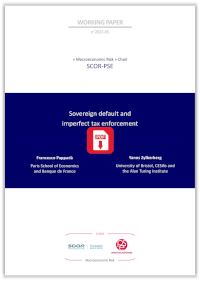By Francesco Pappadà (Paris School of Economics and Banque de France) and Yanos Zylberberg (University of Bristol, CESifo and the Alan Turing Institute)
- Download this working paper in pdf, that includes a dedicated Executive summary (see below).
- WP n°2021-05 from the Working papers serie, “Macroeconomic Risk” Chair, SCOR-PSE.
Executive Summary
Sovereign default risk typically decreases in response of fiscal consolidations. However, the response of sovereign default risk to fiscal policy is dampened when tax enforcement is weak. A fiscal consolidation leads to an expansion of the informal sector, thereby limiting fiscal surpluses, but also hampering future tax collection and failing to reduce default risk. For instance, during the European sovereign debt crisis of 2009 – 2014, several economies with relatively low tax enforcement implemented fiscal consolidations that led to significant welfare costs but limited effects on default risk.
In this paper, we study the dynamics of fiscal policy and default risk when tax enforcement is imperfect. The contribution of the paper is threefold. We first document stylized facts about tax compliance and its dynamics in economies with imperfect tax enforcement, most notably the relationship with fiscal policy and default risk. We then provide a model of sovereign debt with limited commitment in order to understand how the dynamics of tax compliance—disciplined by the empirical moments—affects optimal fiscal policy and default risk. Finally, we quantify the ignored, yet important, welfare cost associated with imperfect tax enforcement : a responsive tax compliance significantly constrains optimal fiscal policies, which, ultimately, has an impact on consumption smoothing.
We uncover novel empirical facts about the dynamics of tax compliance and its impact on default risk. First, we show that tax compliance is volatile and there is large heterogeneity in volatility across countries. Tax compliance is volatile because it strongly responds to fiscal policy and business cycle fluctuations. The heterogeneous volatilities across economies reflect large heterogeneity in such responses. In some economies with imperfect tax enforcement, a larger share of taxpayers hide their activity in downturns and in periods of austerity. In contrast with the standard behavioral response, the magnitude of fluctuations in tax compliance implies sharply decreasing returns to taxes, and some economies display an extreme form of fiscal fatigue. Second, the response of tax compliance to fiscal policy alters the relationship between fiscal policy and default risk. We find that fiscal consolidations are associated with a marked decrease in default risk, but only in countries where tax compliance is inelastic. Instead, when tax compliance strongly responds to taxes, this adjustment directly affects default risk and significantly limits the returns to fiscal consolidations.
We explore the implications of fluctuations in tax compliance on the dynamics of optimal fiscal policy in a model of sovereign debt where a benevolent government uses fiscal policy as a consumption-smoothing instrument. In our quantitative analysis, we evaluate how the dynamic properties of tax compliance affect optimal fiscal policy and welfare by comparing two economies differing along the tax compliance response to fiscal policy and business cycle fluctuations around the (same) steady-state level. The baseline economy differs from the low-response economy in two important dimensions. First, the baseline economy is ten times more likely to experience a default (with a yearly probability of 0.2%, and a yearly probability to be excluded from financial markets of 1.8%). Default is more likely, even though the baseline economy accumulates far less debt on average (10% of output versus 21%). Second, fiscal policy in the baseline economy is less able to smooth fluctuations in consumption : household consumption is much more volatile around the same average levels. We use the model to quantify the costs of such fluctuations and find that they are equivalent to a 2.2% decrease in certainty equivalent consumption. These findings illustrate that fluctuations in tax compliance constrain the set of feasible fiscal policies and significantly lower welfare.

